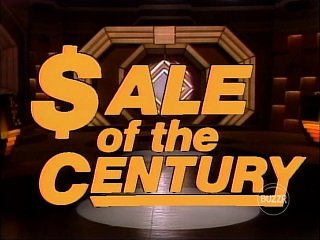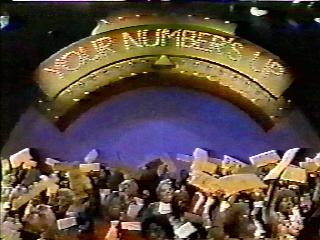
Sale of the Century is an American television game show that originally debuted on September 29, 1969, on NBC daytime. It was one of three NBC game shows to premiere on that date, the other two being the short-lived game shows Letters to Laugh-In and Name Droppers. The series aired until July 13, 1973, and a weekly syndicated series began that fall and ran for one season.

Now You See It is an American television game show created by Frank Wayne for Mark Goodson-Bill Todman Productions. The object of Now You See It is to answer general knowledge trivia questions by finding the answers hidden in a grid, similar to a word search puzzle.

The $1,000,000 Chance of a Lifetime is an American game show which offered a $1 million (annuitized) grand prize to winning contestants. The show aired in syndication from January 6, 1986, until May 22, 1987. The show was hosted by Jim Lange, and he was joined by Karen Thomas as co-host during the second season. Mark Summers was the show's announcer for the first few weeks and Johnny Gilbert announced the remainder of the series. The show was produced by XPTLA, Inc., and distributed by Lorimar-Telepictures.

History IQ is a game show on The History Channel which premiered on October 2, 2000 and aired for two seasons. Marc Summers hosted and Harvey announced, reuniting the two from the Nickelodeon game show Double Dare. History IQ was produced by Glow in the Dark Productions.
BrainTeaser was a British game show based on the original Dutch format of Puzzeltijd. The show was broadcast live, with phone-in viewer puzzles being announced and played during the show in addition to the studio game. During its run from 5 August 2002 to 7 March 2007, it aired on Five Mondays to Fridays, usually for an hour around lunchtime, and was fronted by various presenters rotating with one another. Beginning in August 2005, a version of the show that exclusively focused on viewer participation was broadcast in a four-hour long block on YooPlay TV every day after the Five broadcast, as part of a thirteen-week trial.

Your Number's Up is a game show that aired on NBC from September 23 to December 20, 1985. The show was hosted by Nipsey Russell with Lee Menning as co-host. Announcing duties were handled by Gene Wood for the first month and John Harlan for the rest of the run, with Johnny Haymer and Johnny Gilbert as substitutes.
Deal or No Deal is an Australian game show that airs on Network Ten and originally aired on the Seven Network from 13 July 2003 to 4 October 2013. It was the first international version of the game show, after the original Miljoenenjacht from the Netherlands. It was the first of the versions to use the Deal or No Deal name. It was hosted by Andrew O'Keefe for its entire 10-year run.

Temptation is an Australian game show which premiered on the Nine Network on 30 May 2005 and aired at 7.00pm. Hosted by Ed Phillips and Livinia Nixon, the show was a remake of Sale of the Century, which aired on Nine in the same timeslot for more than twenty years between 1980 and 2001. Temptation had the same general format of its predecessor, but with several new features and a de-emphasis on the "shopping" aspects of the endgame. The show ran until 30 November 2007, when it was placed on hiatus by the network following strong competition from game show Deal or No Deal on the rival Seven Network; during the hiatus, Nine filled the timeslot with episodes of the American sitcom Two and a Half Men. When Ed Phillips made an appearance on The NRL Footy Show he announced "maybe summer" would be the return of the show. This statement was accurate, as Temptation returned for a shortened fourth series from 1 December 2008 with unaired episodes which were recorded during 2008. During that time, Ed Phillips was dumped by the Nine Network after his contract expired in November, and Temptation never returned to the schedule. After 23 January 2009, when the show's final episode aired, all Temptation websites were removed, and Two and a Half Men returned to Channel Nine's 7:00pm schedule.

The Mint was a live, late night, interactive quiz show with celebrity guests and live studio contestants filmed on a large extravagant set designed to look like the inside of a mansion. The programme, which was dogged by criticism that its questions were ambiguous and arbitrary, aired on ITV and ITV2, Sunday to Wednesday. On 26 February 2007, ITV announced that The Mint would return to screens later in 2007, however an announcement on 12 September 2007 confirmed that the show, along with similar late night phone ins, would not be returning.

Where in the World Is Carmen Sandiego? is an American half-hour children's television game show based on the Carmen Sandiego computer game series created by Broderbund. The show was hosted by Greg Lee, who was joined by Lynne Thigpen, and the a cappella vocal group Rockapella, who served as the show's house band and comedy troupe. The series was videotaped in New York City at Chelsea Studios and Kaufman Astoria Studios and co-produced by WQED and WGBH-TV, and aired on PBS stations from September 30, 1991, to December 22, 1995, with reruns continuing to air until May 31, 1996. A total of 295 episodes over five seasons were recorded.
PDQ and Baffle are American television game shows created by Heatter-Quigley Productions. Both shows' objective was for contestant/celebrity teams to guess a given word or phrase in the shortest amount of time with the fewest letters given as possible.

Supermarket Sweep is a British game show that is based on the original American version. Originally hosted by Dale Winton, it ran for exactly 8 years from 6 September 1993 to 6 September 2001 and then revived from 12 February to 31 August 2007 on ITV.
Brain Battle was a Canadian interactive game show, which aired weekdays on Global. The show premiered on March 26, 2007, and aired a total of 356 episodes as of its series finale on August 4, 2008.

Don't Forget the Lyrics! is an American television game show in which contestants compete to win $1 million by correctly recalling song lyrics from a variety of genres. The program originally aired on Fox from July 11, 2007, to June 19, 2009, hosted by Wayne Brady and produced by RDF USA, part of RDF Media. The premiere of the show prompted NBC to move up the premiere of their similar game show, The Singing Bee.

Merv Griffin's Crosswords is an American game show based on crossword puzzles. The show was created by its namesake, Merv Griffin, who died shortly after beginning production on the series. Ty Treadway was the host, and Edd Hall was the announcer.

A lock-out device is a system used on game shows, particularly trivia shows, to determine in real time which contestant has activated their signal first. The system is designed to detect the first signal it receives and ignore subsequent signals. The system provides some indication of which contestant has signaled, such as a light or sound for each contestant, allowing the relevant parties to clearly determine who has signaled first.
The Phone is an American reality television show of six episodes, based on the Dutch version of the same name. The show aired on Fridays at 10:00 p.m. Eastern time on MTV.
20Q is an American game show based on the online artificial intelligence and handheld computer game of the same name. Licensed to and produced by Endemol USA, it premiered on June 13, 2009, during Big Saturday Night airing on GSN, and is hosted by Cat Deeley of So You Think You Can Dance with the voice of Mr. Q provided by Hal Sparks.

One Man Army is a reality television game show produced by Renegade 83 for the Discovery Channel. The show pits four men against various challenges to test intelligence, decision-making, endurance, and physical strength. The host, Mykel Hawke, is a former Green Beret.
Panel Quiz Attack 25 is a game show airing once weekly on the Asahi Broadcasting Corporation network in Japan. The program first aired on April 6, 1975.













